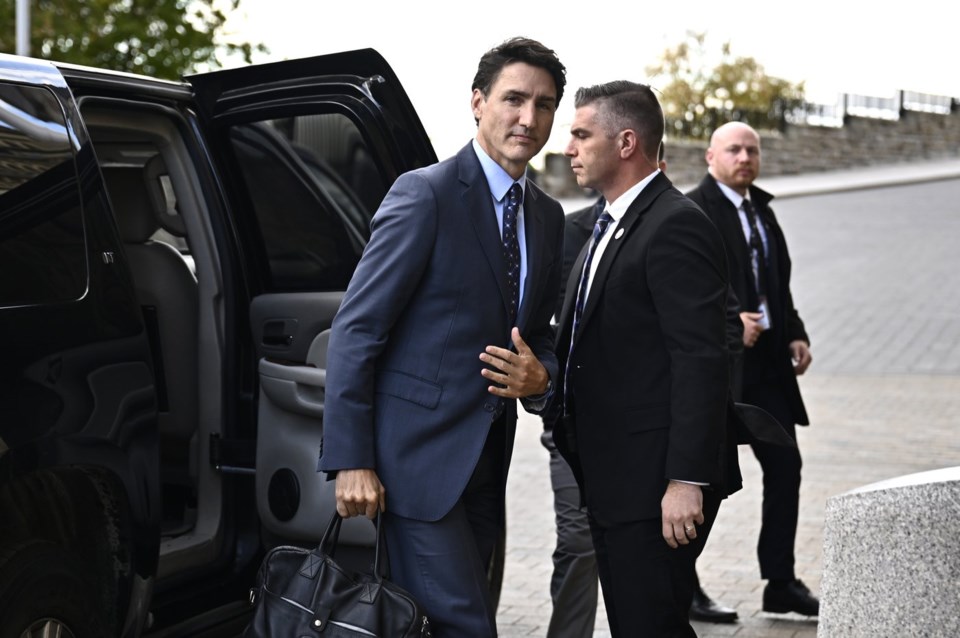OTTAWA — Any Indian diplomats involved in criminal activity in Canada must be subjected to "severe sanctions", NDP Leader Jagmeet Singh charged Tuesday, a day after the RCMP said it had credible evidence linking Indian agents to murder, extortion and coercion in Canada.
On Monday Canada expelled six Indian diplomats, including the high commissioner, after the RCMP announced they had evidence those diplomats played a role in coercively collecting information on South Asian Canadians and then passing that information on to criminal organizations who took violent action, including extortion and murder.
India denied the allegations and expelled six Canadian diplomats in return.
As the seriousness of the situation began to settle in Tuesday, Canada's Trade Minister Mary Ng moved to reassure Canadian businesses with ties to India. In a statement Ng acknowledged the "uncertainty" that Canadian businesses and investors may have as a result as the diplomatic expulsions. She said the government will continue to support commercial and economic ties between the countries.
"However, we must consider our economic interests with the need to protect Canadians and uphold the rule of law," she said. "We will not tolerate any foreign government threatening, extorting or harming Canadian citizens on our soil."
Ng said the government remains "open to a dialogue" with India and looks forward to continuing a "valued relationship."
The House of Commons is not sitting this week, preventing an immediate debate on the matter, but NDP Leader Jagmeet Singh said his party will be asking the House public safety committee to study "other steps we can take to keep Canadians safe."
He called for "severe sanctions on Indian diplomats" involved in criminal activity. The RCMP in its comments Monday said there were six Indian diplomats they sought to question about the violent activities in Canada, and those six are the ones Canada expelled.
Singh said Canada must also ban a Hindu group that has been accused of hate speech by Sikh and Muslim groups.
"We are in uncharted territory, with implications for the diplomatic relationship as well as for Canada's public safety and national security," said Vina Nadjibulla, research vice-president for the Asia Pacific Foundation.
Nadjibulla said she's watching to see how Canada's peers respond to the "unprecedented, extraordinary" news. That could mean diplomatic moves behind the scenes, and possibly public statements of support for Canada.
"The reaction from the U.S. is going to be the one that everybody will be paying attention to," she said.
"In order for Canada, at this stage, to have any kind of co-operation from India and seek accountability for what has happened, we would need India to feel some pressure; we would need India to feel some reason to co-operate."
The U.S. State Department is scheduled to have a regularly scheduled press briefing this afternoon.
The Bloc Québécois asked Tuesday for Ottawa to "intensify collaboration with Canada's allies in terms of intelligence and solidarity, in the face of such acts."
The Conservatives Monday denounced Canada's "extremely concerning" allegations as proof that the government had not taken seriously foreign interference and national security.
India has insisted Canada has provided it no evidence to back up any of the allegations.
RCMP Commissioner Mike Duheme said the force's deputy commissioner had attempted to share evidence with Indian police last week but was rebuffed. This past weekend, deputy foreign affairs minister David Morrison, along with the RCMP, presented evidence to India in meetings held in Singapore. Canada sought India's agreement to revoke the diplomatic immunity of the six individuals but India refused.
Foreign Affairs Minister Mélanie Joly said India's refusal to co-operate is why Canada declared the six diplomats persona non grata, which is one of the stiffest penalties Canada can impose under the Vienna Convention.
Nadjibulla said it was notable that Joly accused active diplomats of involvement in criminality, and that she said violence linked to the Indian government had only increased since Canada made its concerns public last year.
In September 2023, Prime Minister Justin Trudeau announced that Canadian intelligence services were investigating "credible" information about "a potential link" between India's government and the killing of Sikh leader Hardeep Singh Nijjar in British Columbia.
Nadjibulla said Ottawa has now "very clearly and assertively" made its case, in sending senior officials this past weekend to present evidence to Indian counterparts.
"Canada did what it thought was necessary," she said.
Nadjibulla added that it's rare for diplomats to be expelled over accusations of criminality. "We're not dealing here with a rogue state; we're dealing here with a very important international player," she said.
This report by The Canadian Press was first published Oct. 15, 2024.
Dylan Robertson and Laura Osman, The Canadian Press



